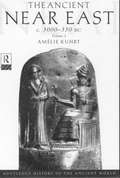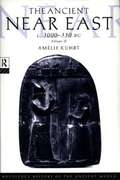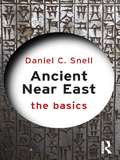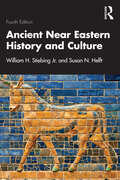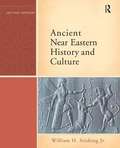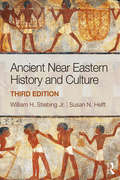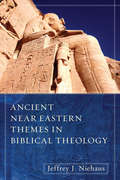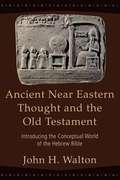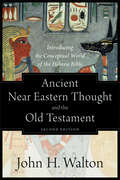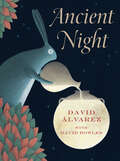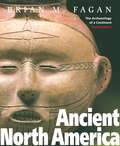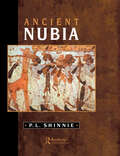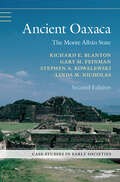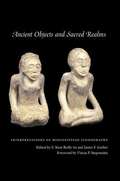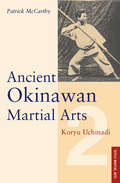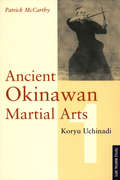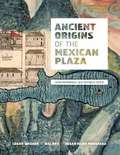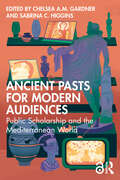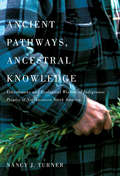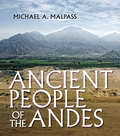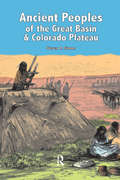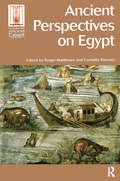- Table View
- List View
Ancient Near East c. 3000-330 BC
by Amelie KuhrtThis book is intended as an introduction to ancient Near Eastern history, the main sources used for reconstructing societies and political systems, and some historical problems and scholarly debates. It is emphatically not a history in the conventional sense of the word, for two reasons: first, as I have emphasised at several points, it is impossible to write a narrative history of events; second, I am not a specialist in all areas and periods of the complex Near Eastern region. I have tried to treat the periods and areas usually studied in universities, which means that, inevitably, my coverage is selective. My treatment of Egypt has been kept brief deliberately, as there are plenty of good studies of Egyptian history at all levels.
Ancient Near East c. 3000-330 BC Volume 2
by Amélie KuhrtThe ancient Near East embraces a vast geographical area, from the borders of Iran and Afghanistan in the east to the Levant and Anatolia, and from the Black Sea in the north to Egypt in the south. In this authoritative study, Amelie Kuhrt examines its history from the earliest written documents to the conquest of Alexander the Great, c. 3000-330 B. C. It provides a lucid, up-to-date narrative which takes into account the latest archaeological and textual discoveries and deals with the complex problems of interpretation and methodology.
Ancient Near East: The Basics (The Basics)
by Daniel C. SnellAncient Near East: The Basics surveys the history of the ancient Middle East from the invention of writing to Alexander the Great’s conquest. The book introduces both the physical and intellectual environment of those times, the struggles of state-building and empire construction, and the dissent from those efforts. Topics covered include: What do we mean when we talk about the Ancient Near East? The rise and fall of powerful states and monarchs Daily life both in the cities and out in the fields The legacy of the Ancient Near East: religion, science and writing systems. Featuring a glossary, chronology and suggestions for further reading, this book has all the tools the reader needs to understand the history and study of the Ancient Near East.
Ancient Near Eastern History and Culture
by Susan N. Helft William H. Stiebing Jr.Ancient Near Eastern History and Culture offers an historical overview of the civilizations of the ancient Near East spanning ten thousand years of history. This new edition is a comprehensive introduction to the history and culture of the Near East, from prehistory and the beginnings of farming to the fall of Achaemenid Persia. Through text, images, maps, and historical documents, readers discover the material, social, and political world of cultures from Egypt to India, allowing students to see how these intertwined cultures interacted throughout history. Now fully updated and incorporating the latest scholarship on society, religion, and the economy, this book highlights the changing fortunes of these great civilizations. A special feature of this book is its many "Debating the Evidence" sections, where the reader becomes familiar with scholarly disputes concerning the interpretation of textual and archaeological evidence on a variety of topics and case studies. The fourth edition of Ancient Near Eastern History and Culture remains a crucial textbook for undergraduates and general readers studying the ancient Near East, particularly the political and social history of ancient Egypt and Mesopotamia, as well as students of archaeology and biblical studies who are working on the region.
Ancient Near Eastern History and Culture
by William H. Stiebing Jr.This introduction to the Ancient Near East includes coverage of Egypt and a balance of political, social, and cultural coverage. Organized by the periods, kingdoms, and empires generally used in Near Eastern political history, the text interlaces social and cultural history with the political narrative. This combination allows students to get a rounded introduction to the subject of Ancient Near Eastern history. An emphasis on problems and areas of uncertainty helps students understand how evidence is used to create interpretations and allows them to realize that several different interpretations of the same evidence are possible.This introduction to the Ancient Near East includes coverage of Egypt and a balance of political, social, and cultural coverage.
Ancient Near Eastern History and Culture (3rd Edition)
by William H. Stiebing Jr. Susan N. Helft<p>Organized by the periods, kingdoms, and empires generally used in ancient Near Eastern political history, Ancient Near Eastern History and Culture interlaces social and cultural history with a political narrative. Charts, figures, maps, and historical documents introduce the reader to the material world of the ancient Near East, including Egypt. The emphasis on historical debates and areas of uncertainty helps students understand how historians use evidence to create interpretations and that several different interpretations of history are possible. New features in this edition include: <p> <li>Reorganization of the chapters on the early periods, with discussions incorporating the latest archaeological finds. <li>New "Debating the Evidence" sections discussing current controversial issues in Near Eastern history. These sections make it easy for students and teachers to find and use the portions of the text devoted to scholarly arguments about various aspects of ancient Near Eastern history. <li>A new chapter, "Ancient Israel and Judah," has been added to cover more completely the crucial issues of ancient Israelite history and religion. <li>More emphasis has been placed on the role and contributions of women in the ancient Near East.</li> <p> <p>The most important change is the addition of co-author Susan N. Helft, a specialist in the art and archaeology of the ancient Near East, who has applied her considerable knowledge, insight, research, and editing skills throughout the book. This new edition of Ancient Near Eastern History and Culture will remain a crucial text for students beginning to learn about the fascinating civilizations of the Near East.</p>
Ancient Near Eastern Themes in Biblical Theology
by Jeffrey J. NiehausAncient Near Eastern Themes in Biblical Theology traces the many parallels between the Old Testament (and Bible as a whole) and the ancient Near East, including creation and flood narratives, common literary and legal forms, supposed acts of deities and the God of the Bible, and more. Instead of merely studying a random selection of parallels, however, Jeffrey Niehaus proposes that they represent “a shared theological structure of ideas in the ancient Near East, a structure that finds its most complete and true form in the Old and New Testaments.” This comprehensive and enlightening resource promises to help students and discerning Bible readers to intellectually grasp and appreciate the overarching story of the Bible within its cultural development.
Ancient Near Eastern Thought And The Old Testament
by John H. WaltonMuch of the Old Testament seems strange to contemporary readers. However, as we begin to understand how ancient people viewed the world, the Old Testament becomes more clearly a book that stands within its ancient context as it also speaks against it. John Walton provides here a thoughtful introduction to the conceptual world of the ancient Near East. Walton surveys the literature of the ancient Near East and introduces the reader to a variety of beliefs about God, religion, and the world. In helpful sidebars, he provides examples of how such studies can bring insight to the interpretation of specific Old Testament passages. Students and pastors who want to deepen their understanding of the Old Testament will find this a helpful and instructive study.
Ancient Near Eastern Thought and the Old Testament: Introducing The Conceptual World Of The Hebrew Bible
by John H. WaltonA leading evangelical scholar surveys the cultural context of the ancient Near East, bringing insight to the interpretation of specific Old Testament passages. Now thoroughly updated and revised throughout.
Ancient Night
by David BowlesPublishers Weekly Best of the Year BookPage Best of the Year Junior Library Guild Gold Standard Evanston Library Best of the Year Horn Book 2023 Summer Reading List "Vivid and vibrant." —NPR Weekend Edition At the start of things, the elders say, the universe was hushed and still. The moon alone shone bright and round in the star-speckled dark of the sky. David Álvarez is one of the most extraordinary artists working today. His black-and-white illustrations have gained fame in his home country of Mexico and around the world. Here, in Ancient Night (Noche Antigua), David displays his immense talent with full-color illustrations for the first time. Ancient Night is a twist on two Nahuatl traditions: the rabbit which the Feathered Serpent placed on the moon, and Yaushu, the Lord Opossum who ruled the earth before humans came, and who stole fire from the gods to create the sun. Award-winning author David Bowles has written a poetic text – and carefully researched backmatter – to accompany David’s lush illustrations and story. Published simultaneously in English and Spanish editions, Ancient Night offers young readers everywhere the chance to savor this ancient tale in its most beautiful format possible. P R A I S E A Junior Library Guild Gold Standard ★ "Bolstered by the ethereal, whimsical text, the plush, incandescent acrylic and oil paint artwork gathers the subtleties and splendors of nighttime and the plant life that surrounds Rabbit and Opossum. Together words and images tug readers along at a measured pace. An excellent authors’ note underscores how common strands and crucial differences from wide-ranging Mesoamerican legends and myths furnish the inspiration at the roots of this tale. Like a mighty dream recalled from time gone by." —Kirkus (starred) ★ "Luminous acrylic and oil illustrations bring the night to life... Enchanting text presents the tale in short, clear sentences that convey a sense of timeless mystery and beauty... An excellent choice for picture book collections that uniquely explores traditional Mesoamerican tales and is sure to inspire the wish for further discovery and appreciation." —School Library Journal (starred) ★ "Bowles’ spare, evocative text flows like poetry… Álvarez’s compositions are sophisticated and uncluttered… beautifully crafted, gently stylized figures so remarkably textured that you can almost count the number of hairs on Rabbit’s body. Ancient Night is wondrous, sparkling and easily one of the best picture books of 2023." —BookPage (starred) ★ "Bowles’s unhurried lines offer a playfully elegant feel to the telling, while Álvarez’s saturated digitized paintings use a limited palette to imagine long-eared, gray Rabbit and pointy-nosed, rust-hued Opossum against luminous leafy landscapes. Together, the collaborators create a dreamlike story variation that truly shines." —Publishers Weekly (starred) ★ "Unmissable… The breathtaking illustrations exude light themselves…" —Foreword Reviews (starred) ★ "Stunning illustrations by acclaimed Mexican artist Álvarez feature a velvety black backdrop of a sky, stars providing only pinpricks of light...spellbinding, poetic text is lyrical but crisp." —Horn Book (starred) "A calming selection for evening lap reads and storytimes." —BCCB "A perfect bedtime read aloud. This Mesoamerican-inspired fable borrows from old tales for a larger-than-life yet soothingly illustrated picture book." —Shelf-Awareness "Exquisite." —Melissa Taylor, Imagination Soup "Álvarez’s illustrations alone are enough to make this stunning picture book a winner—the dreamy feel of the milky moonlight against the deep-dark night and the crisp simplicity of the animals and their world is masterful. When paired with interwoven traditional Mesoamerican tales of the magic and power of our lunar companion, the story sings, enchanting readers with its mystery and beauty. Don’t miss this one!" —Southe
Ancient North America: The Archaeology of a Continent (4th edition)
by Brian M. FaganAnarrative account of what is known of the diverse ancient societies of North America.
Ancient Nubia
by ShinnieFirst published in 1996. Routledge is an imprint of Taylor & Francis, an informa company.
Ancient Oaxaca: The Monte Albán State (Case Studies in Early Societies)
by Gary M. Feinman Stephen A. Kowalewski Richard E. Blanton Linda M. NicholasOver two thousand years ago, Oaxaca, Mexico, was the site of one of the New World's earliest episodes of primary state formation and urbanism, and today it is one of the world's archaeologically best-studied regions. This volume, which thoroughly revises and updates the first edition, provides a highly readable yet comprehensive path to acquaint readers with one of the earliest and best-known examples of Native American state formation and its consequences as seen from the perspectives of urbanism, technology, demography, commerce, households, and religion and ritual. Written by prominent archaeological researchers who have devoted decades to Oaxacan research and to the development of suitable social theory, the book places ancient Oaxaca within the context of the history of ideas that have addressed the causes and consequences of social evolutionary change. It also critically evaluates the potential applicability of more recent thinking about state building grounded in collective action and related theories.
Ancient Objects and Sacred Realms: Interpretations of Mississippian Iconography
by James F. Garber F. Kent Reilly IIIBetween AD 900-1600, the native peoples of the Mississippi River Valley and other areas of the Eastern Woodlands of the United States conceived and executed one of the greatest artistic traditions of the Precolumbian Americas. Created in the media of copper, shell, stone, clay, and wood, and incised or carved with a complex set of symbols and motifs, this seven-hundred-year-old artistic tradition functioned within a multiethnic landscape centered on communities dominated by earthen mounds and plazas. Previous researchers have referred to this material as the Southeastern Ceremonial Complex (SECC). This groundbreaking volume brings together ten essays by leading anthropologists, archaeologists, and art historians, who analyze the iconography of Mississippian art in order to reconstruct the ritual activities, cosmological vision, and ideology of these ancient precursors to several groups of contemporary Native Americans. Significantly, the authors correlate archaeological, ethnographic, and art historical data that illustrate the stylistic differences within Mississippian art as well as the numerous changes that occur through time. The research also demonstrates the inadequacy of the SECC label, since Mississippian art is not limited to the Southeast and reflects stylistic changes over time among several linked but distinct religious traditions. The term Mississippian Iconographic Interaction Sphere (MIIS) more adequately describes the corpus of this Mississippian art. Most important, the authors illustrate the overarching nature of the ancient Native American religious system, as a creation unique to the native American cultures of the eastern United States.
Ancient Okinawan Martial Arts: 002
by Patrick Mccarthy Yuriko MccarthyIn Ancient Okinawan Martial Arts: Koryu Uchinadi the Western reader has ready access, for the first time, to an extensive collection of the most important documents written by and about Okinawa's most famous karate and kobudo masters and their arts, as well as to photographs of kobujutsu katas of historical significance.This two-volume anthology includes previously untranslated texts by Chojun Miyagi (founder of Goju Ryu Karate), Kenwa Mabuni (founder of Shito Ryu Karate), Shinken Taira (founder of Ryukyu Kobudo), Choshin Chibana (founder of Kobayashi Shorin Ryu Karate), and Choki Motobu (the notorious scrapper who in his maturity went on to teach many who became great masters in their own right). Patrick McCarthy-with the able assistance of his wife, Yuriko McCarthy-provides expert translation and commentary based on his extensive research into these masters and the systems they founded, as well as into the establishment of the Okinawan karate tradition in the main islands of Japan.
Ancient Okinawan Martial Arts: 1
by Patrick MccarthyIn Ancient Okinawan Martial Arts:Koryu Uchinadi the Western reader has ready access, for the first time, to an extensive collection of the most importantdocuments written by and about Okinawa's most famous karate and kobudo masters and their arts, as well as to photographs of kobujutsu katas of histori-cal significance. This two-volume anthology includes previously untranslated texts by Chojun Miyagi (founder of Goju Ryu karate), Kenwa Mabuni (founder of Shiro R yu karate), Shinken Taira (fou nder of Ryukyu Kobudo), C hos hin Chibana (founder of Kobayas hi Shorin Ryu karate), and Choki Morobu (the notorious scrapper who in his maturity went on to reach many who became great masters in their own right). Patrick McCarthy-with the able assistance of his wife, Yuriko McCarthy- provides expert translation and commentary based on his extensive research into these masters and the systems they founded, as well as into the establishment of the Okinawan karate tradition in the main islands of japan.
Ancient Origins of the Mexican Plaza: From Primordial Sea to Public Space
by Logan Wagner Hal Box Susan Kline MoreheadThe plaza has been a defining feature of Mexican urban architecture and culture for at least 4,000 years. Ancient Mesoamericans conducted most of their communal life in outdoor public spaces, and today the plaza is still the public living room in every Mexican neighborhood, town, and city-the place where friends meet, news is shared, and personal and communal rituals and celebrations happen. The site of a community's most important architecture-church, government buildings, and marketplace-the plaza is both sacred and secular space and thus the very heart of the community. This extensively illustrated book traces the evolution of the Mexican plaza from Mesoamerican sacred space to modern public gathering place. The authors led teams of volunteers who measured and documented nearly one hundred traditional Mexican town centers. The resulting plans reveal the layers of Mesoamerican and European history that underlie the contemporary plaza. The authors describe how Mesoamericans designed their ceremonial centers as embodiments of creation myths-the plaza as the primordial sea from which the earth emerged. They discuss how Europeans, even though they sought to eradicate native culture, actually preserved it as they overlaid the Mesoamerican sacred plaza with the Renaissance urban concept of an orthogonal grid with a central open space. The authors also show how the plaza's historic, architectural, social, and economic qualities can contribute to mainstream urban design and architecture today.
Ancient Pasts for Modern Audiences: Public Scholarship and the Mediterranean World
by Chelsea A.M. Gardner and Sabrina C. HigginsThis volume brings together specialists from a broad demographic and professional range – academics, museum curators, students, and content creators – to discuss case studies, challenges, and potential future avenues for public scholarship on the history, archaeology, and cultures of the ancient Mediterranean, North Africa and Western Asia.Together, the contributions promote the creation of inclusive methods of knowledge mobilisation and communication in public spheres across three main areas: cultural heritage, pedagogy and public-facing scholarship. These areas have all been directly affected by Eurocentric structures that have claimed ownership of ancient Mediterranean cultural heritage and have dictated how it has been taught in schools and communicated to the broader public. The volume is divided into three sections – Museums, Teaching and Learning, and Global and Local Projects – each addressing pressing challenges faced within these interrelated fields and offering ways for us to overcome the exclusionary narratives that plague them.Ancient Pasts for Modern Audiences provides an invaluable resource for those interested in public history, from academics to lay audiences, in the fields of Ancient Mediterranean, North African, and Western Asian Studies. The book also appeals to professionals and researchers whose interests lie in public-facing scholarship, pedagogy, digital humanities, decolonisation studies, museum studies and popular media.The Open Access version of this book, available at http://www.taylorfrancis.com, has been made available under a Creative Commons Attribution-Non Commercial-No Derivatives (CC BY-NC-ND) 4.0 license.
Ancient Pathways, Ancestral Knowledge
by Nancy TurnerVolume 1: The History and Practice of Indigenous Plant Knowledge Volume 2: The Place and Meaning of Plants in Indigenous Cultures and Worldviews Nancy Turner has studied Indigenous peoples' knowledge of plants and environments in northwestern North America for over forty years. In Ancient Pathways, Ancestral Knowledge, she integrates her research into a two-volume ethnobotanical tour-de-force. Drawing on information shared by Indigenous botanical experts and collaborators, the ethnographic and historical record, and from linguistics, palaeobotany, archaeology, phytogeography, and other fields, Turner weaves together a complex understanding of the traditions of use and management of plant resources in this vast region. She follows Indigenous inhabitants over time and through space, showing how they actively participated in their environments, managed and cultivated valued plant resources, and maintained key habitats that supported their dynamic cultures for thousands of years, as well as how knowledge was passed on from generation to generation and from one community to another. To understand the values and perspectives that have guided Indigenous ethnobotanical knowledge and practices, Turner looks beyond the details of individual plant species and their uses to determine the overall patterns and processes of their development, application, and adaptation. Volume 1 presents a historical overview of ethnobotonical knowledge in the region before and after European contact. The ways in which Indigenous peoples used and interacted with plants - for nutrition, technologies, and medicine - are examined. Drawing connections between similarities across languages, Turner compares the names of over 250 plant species in more than fifty Indigenous languages and dialects to demonstrate the prominence of certain plants in various cultures and the sharing of goods and ideas between peoples. She also examines the effects that introduced species and colonialism had on the region's Indigenous peoples and their ecologies. Volume 2 provides a sweeping account of how Indigenous organizational systems developed to facilitate the harvesting, use, and cultivation of plants, to establish economic connections across linguistic and cultural borders, and to preserve and manage resources and habitats. Turner describes the worldviews and philosophies that emerged from the interactions between peoples and plants, and how these understandings are expressed through cultures' stories and narratives. Finally, she explores the ways in which botanical and ecological knowledge can be and are being maintained as living, adaptive systems that promote healthy cultures, environments, and indigenous plant populations. Ancient Pathways, Ancestral Knowledge both challenges and contributes to existing knowledge of Indigenous peoples' land stewardship while preserving information that might otherwise have been lost. Providing new and captivating insights into the anthropogenic systems of northwestern North America, it will stand as an authoritative reference work and contribute to a fuller understanding of the interactions between cultures and ecological systems.
Ancient Pathways, Ancestral Knowledge: Ethnobotany and Ecological Wisdom of Indigenous Peoples of Northwestern North America (McGill-Queen's Indigenous and Northern Studies #74)
by Nancy TurnerVolume 1: The History and Practice of Indigenous Plant Knowledge Volume 2: The Place and Meaning of Plants in Indigenous Cultures and Worldviews Nancy Turner has studied Indigenous peoples' knowledge of plants and environments in northwestern North America for over forty years. In Ancient Pathways, Ancestral Knowledge, she integrates her research into a two-volume ethnobotanical tour-de-force. Drawing on information shared by Indigenous botanical experts and collaborators, the ethnographic and historical record, and from linguistics, palaeobotany, archaeology, phytogeography, and other fields, Turner weaves together a complex understanding of the traditions of use and management of plant resources in this vast region. She follows Indigenous inhabitants over time and through space, showing how they actively participated in their environments, managed and cultivated valued plant resources, and maintained key habitats that supported their dynamic cultures for thousands of years, as well as how knowledge was passed on from generation to generation and from one community to another. To understand the values and perspectives that have guided Indigenous ethnobotanical knowledge and practices, Turner looks beyond the details of individual plant species and their uses to determine the overall patterns and processes of their development, application, and adaptation. Volume 1 presents a historical overview of ethnobotanical knowledge in the region before and after European contact. The ways in which Indigenous peoples used and interacted with plants - for nutrition, technologies, and medicine - are examined. Drawing connections between similarities across languages, Turner compares the names of over 250 plant species in more than fifty Indigenous languages and dialects to demonstrate the prominence of certain plants in various cultures and the sharing of goods and ideas between peoples. She also examines the effects that introduced species and colonialism had on the region's Indigenous peoples and their ecologies. Volume 2 provides a sweeping account of how Indigenous organizational systems developed to facilitate the harvesting, use, and cultivation of plants, to establish economic connections across linguistic and cultural borders, and to preserve and manage resources and habitats. Turner describes the worldviews and philosophies that emerged from the interactions between peoples and plants, and how these understandings are expressed through cultures’ stories and narratives. Finally, she explores the ways in which botanical and ecological knowledge can be and are being maintained as living, adaptive systems that promote healthy cultures, environments, and indigenous plant populations. Ancient Pathways, Ancestral Knowledge both challenges and contributes to existing knowledge of Indigenous peoples' land stewardship while preserving information that might otherwise have been lost. Providing new and captivating insights into the anthropogenic systems of northwestern North America, it will stand as an authoritative reference work and contribute to a fuller understanding of the interactions between cultures and ecological systems.
Ancient People of the Andes
by Michael A. MalpassIn Ancient People of the Andes, Michael A. Malpass describes the prehistory of western South America from initial colonization to the Spanish Conquest. All the major cultures of this region, from the Moche to the Inkas, receive thoughtful treatment, from their emergence to their demise or evolution. No South American culture that lived prior to the arrival of Europeans developed a writing system, making archaeology the only way we know about most of the prehispanic societies of the Andes. The earliest Spaniards on the continent provided first-person accounts of the latest of those societies, and, as descendants of the Inkas became literate, they too became a source of information. Both ethnohistory and archaeology have limitations in what they can tell us, but when we are able to use them together they are complementary ways to access knowledge of these fascinating cultures. Malpass focuses on large anthropological themes: why people settled down into agricultural communities, the origins of social inequalities, and the evolution of sociopolitical complexity. Ample illustrations, including eight color plates, visually document sites, societies, and cultural features. Introductory chapters cover archaeological concepts, dating issues, and the region's climate. The subsequent chapters, divided by time period, allow the reader to track changes in specific cultures over time.
Ancient Peoples of the Great Basin and Colorado Plateau
by Steven R SimmsWritten to appeal to professional archaeologists, students, and the interested public alike, this book is a long overdue introduction to the ancient peoples of the Great Basin and northern Colorado Plateau. Through detailed syntheses, the reader is drawn into the story of the habitation of the Great Basin from the entry of the first Native Americans through the arrival of Europeans. Ancient Peoples is a major contribution to Great Basin archaeology and anthropology, as well as the general study of foraging societies.
Ancient Persia
by Matt WatersThe Achaemenid Persian Empire, at its greatest territorial extent under Darius I (r. 522-486 BCE), held sway over territory stretching from the Indus River Valley to southeastern Europe and from the western Himalayas to northeast Africa. In this book, Matt Waters gives a detailed historical overview of the Achaemenid period while considering the manifold interpretive problems historians face in constructing and understanding its history. This book offers a Persian perspective even when relying on Greek textual sources and archaeological evidence. Waters situates the story of the Achaemenid Persians in the context of their predecessors in the mid-first millennium BCE and through their successors after the Macedonian conquest, constructing a compelling narrative of how the empire retained its vitality for more than two hundred years (c. 550-330 BCE) and left a massive imprint on Middle Eastern as well as Greek and European history.
Ancient Persia and Iranian Civilization
by Clement HuartOriginally published between 1920-70,The History of Civilization was a landmark in early twentieth century publishing. It was published at a formative time within the social sciences, and during a period of decisive historical discovery. The aim of the general editor, C.K. Ogden, was to summarize the most up to date findings and theories of historians, anthropologists, archaeologists and sociologists. This reprinted material is available as a set, in the following groupings, or as individual volumes: * Prehistory and Historical Ethnography Set of 12: 0-415-15611-4: £800.00 * Greek Civilization Set of 7: 0-415-15612-2: £450.00 * Roman Civilization Set of 6: 0-415-15613-0: £400.00 * Eastern Civilizations Set of 10: 0-415-15614-9: £650.00 * Judaeo-Christian Civilization Set of 4: 0-415-15615-7: £250.00 * European Civilization Set of 11: 0-415-15616-5: £700.00
Ancient Perspectives on Egypt (Encounters with Ancient Egypt)
by Roger MatthewsThe allure of Egypt is not exclusive to the modern world. Egypt also held a fascination and attraction for people of the past. In this book, academics from a wide range of disciplines assess the significance of Egypt within the settings of its past. The chronological span is from later prehistory, through to the earliest literate eras of interaction with Mesopotamia and the Levant, the Aegean, Greece and Rome. Ancient Perspectives on Egypt includes both archaeological and documented evidence, which ranges from the earliest writing attested in Egypt and Mesopotamia in the late fourth millennium BC, to graffiti from Abydos that demonstrate pilgrimages from all over the Mediterranean world, to the views of Roman poets on the nature of Egypt. This book presents, for the first time in a single volume, a multi-faceted but coherent collection of images of Egypt from, and of, the past.
